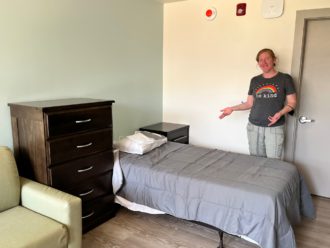Jeremy Trull has waited a long time for housing: four walls, a door and some privacy. But he’s hoping that this month, after 13 years of living on the street, he can move into Compass Point Village, a permanent supportive housing project developed by local nonprofit Homeward Bound. He signed his lease in mid-July.
“My whole summer has been absorbed by just waiting on housing,” says Trull, whom Xpress interviewed at the organization’s AHOPE Day Center.
Compass Point Village, a renovated Days Inn motel on Tunnel Road, will provide one-room apartments and supportive services to 85 people, many of them considered to be chronically homeless. According to the National Alliance to End Homelessness, the term refers to those “who have experienced homelessness for at least a year — or repeatedly — while struggling with a disabling condition such as a serious mental illness, substance use disorder or physical disability.”
In keeping with Asheville’s “coordinated entry” strategy, which emphasizes cooperation among the multiple nonprofits working with local homeless folks, priority is given to the people with the greatest need. Those organizations will collectively decide how to allocate any remaining units, says Alanna Kinsella, the organization’s assistant director of permanent supportive housing. A few individuals whom Homeward Bound had previously placed in other permanent housing units will transition to Compass Point Village, she explains.
Leases at the village are for one year, and the rent includes utilities like water, heat and internet. In accordance with U.S. Department of Housing and Urban Development policy, people with no income won’t pay rent, Kinsella explains. Others will pay no more than 30% of their income. In addition, residents won’t be required to pay the first and/or last month’s rent as a deposit.
The $17.8 million project has received funding from many sources. The Dogwood Health Trust, Buncombe County and the City of Asheville each contributed $2 million toward the property’s $6.5 million purchase price. The city’s share leveraged federal American Rescue Plan Act funds. The Dogwood Health Trust was created in 2018 to “dramatically improve the health and well-being of all people and communities in Western North Carolina,” according to its website. The nonprofit’s primary funding was the $1.5 billion that HCA Healthcare, a Nashville-based business, paid to acquire Asheville’s Mission Health System.
One of the goals of Compass Point Village is to help residents gain independence. Accordingly, they are free to move out if they wish; however, the apartments are meant to be “their forever home,” says David Nash, Homeward Bound’s interim executive director.
Trull, meanwhile, says, “I am just very appreciative of the good Lord above and these nice people and the state of North Carolina and Asheville who are going to so kindly and so generously give me an apartment.”
The hardest thing
Trull says he’s been coming to AHOPE for years. “Not having a place to live is probably the hardest thing you’ll ever do in your life — besides starving to death,” he tells Xpress.
For eight years, Trull camped outdoors. More recently, “I’ve been sleeping in the back of a truck the last few years, and it ain’t no picnic.” Trull has only occasionally been able to stay indoors with friends and says he hasn’t wanted to move into public housing because of “everything that goes on there.” For him, one of the highlights of Compass Point Village is the gate around the property and the fact that it’s “hard for people to get in and out.”
Trull, who grew up in Haywood County, describes fractured relationships both with former partners and with his parents, whom he says grew and sold marijuana. Trull describes having worked in construction and building hot rods and says that at one point he owned a home. But he blames himself for his lack of housing now and for not having relationships with his two adult children. “I’ve made a lot of bad decisions in my life that led me where I’m at,” he says.
Among the harsher aspects of Trull’s life story are the four years spent running from a felony charge and a stint in prison. At this point, however, “I really appreciate everything people are doing to make it easier on me.”
Living without housing, says Trull, entails a great deal of suffering. “What we have out here is no different than combat fatigue. Once you’ve been homeless, it can bring your life so far down that it can take a whole lot to bring it back up. You lose parts of yourself along the way, build lots of barriers and walls, mental barriers: You try to keep things out of your head that are gonna drive you nuts, then you got to physically deal with it.”
A new beginning

Compass Point Village isn’t Homeward Bound’s first foray into permanent supportive housing. The Woodfin Apartments, whose 18 units house formerly homeless people, have had a 92% retention rate, notes Nash, demonstrating that the concept can work. A 2020 study in The Lancet noted, “Permanent supportive housing and income assistance interventions were effective in reducing homelessness and achieving housing stability.”
Compass Point will offer services such as mental health support and on-site medical care, which are crucial for housing this population, Kinsella explains. Woodfin Apartments residents also have access to those services, though they’re off-site due to space limitations. In addition, living within a gated residence will ensure privacy for people experiencing mental health crises, helping them self-regulate. When crises occur on the street, these individuals often feel exposed and vulnerable, and the presence of others can exacerbate their distress, she notes.
At Compass Point Village, resident safety advisers will provide 24/7 security, assisted by video monitors. The advisers will also control whether nonresidents will be allowed past the lobby. Residents, however, will have key cards.
Violence will be forbidden on the premises, and violating that rule could get someone evicted. But the residents aren’t required to be in recovery from substance use or to have employment. Those low barriers, Kinsella maintains, are critical to the project’s success.
The facility includes a dining area that will serve one hot meal per day, donated by the Equal Plates Project, a local nonprofit formerly known as We Give a Share. There’s also a computer lounge/library and an office for another local nonprofit, the Sunrise Community for Recovery and Wellness.
Making it work
The 85 studio apartments will serve mostly single adults, with some larger apartments reserved for couples. Although children are welcome to visit as guests of residents, families with children aren’t eligible to live here because some of the residents have criminal records involving sex offenses, says Kinsella.
Every unit includes a bathroom and a kitchenette and comes furnished with a couch, two-burner stove, refrigerator, microwave, wall-mounted TV and either a single or double bed. Each apartment is approximately 500 square feet; several are wheelchair-accessible.
Compass Point Village’s Tunnel Road location is served by bus lines, making it more feasible for residents who don’t have a car. It’s also within walking distance of a Walgreens, Ingles, Whole Foods, a convenience store and the Asheville Mall.
Once Trull is settled into his apartment, he says he’ll seek employment at the mall, noting, “Hopefully I’ll be able to get myself back into the workforce and try to have some kind of a normal life.” But while he’s excited about the stainless steel appliances and the attractive flooring, the best part about his new apartment, he says, will be the lock on the door. “I’ll be able to have possessions and not have anybody steal them.”
Other future residents have their own ideas about which aspect of having their own home is most appealing. For Lea Lea Mounce, the highlight will be her TV. “My first night there I’m going to sit there doing this,” she says, miming clicking the buttons of a remote control.
Kinsella, meanwhile, says she’s been most surprised by another response she’s heard from incoming residents: ice cream. Homeless people, she explains, lack consistent access to freezers, so a Compass Point Village apartment may be their first opportunity in a long time to keep perishable foods. “It’s the little things,” she adds with a smile.





Check and see how many registered sex offenders and people convicted of violent crimes live here. Public info. Hint, it’s a lot.